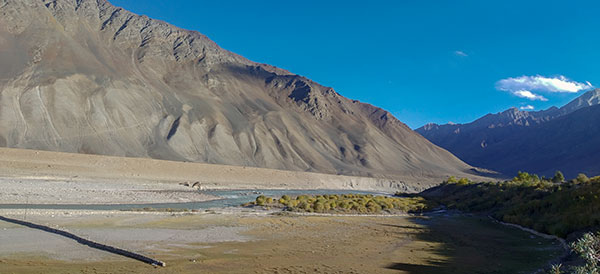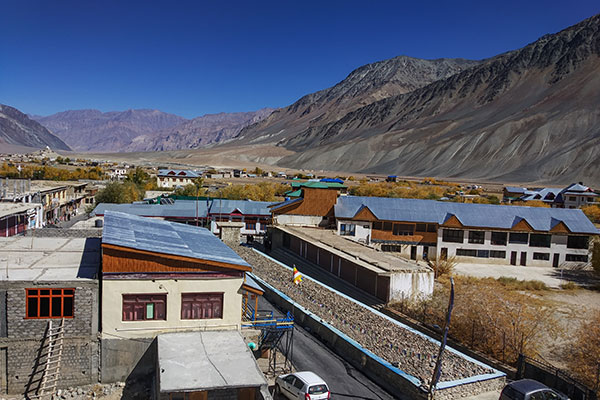The internet is a central part of our lives today, especially mobile internet whose influence in the lives of people is evident in every developed region of the planet. Internet and mobile data services have fuelled the rapid growth of information technology and play an important role in bridging the digital divide that exists in India even today.
Mobile internet has entered every household where this facility if available. With the popularity of smart phones, everything in the market is now available from inside the comfort of your home, depending on your internet connection. The advancement in this field has led to the development of sectors such as digital marketing and slew of online services such as classes, business, shopping, healthcare, e-banking, UPI transactions, video calling etc. All of this has eased the lives of people and enhanced their access to various services.
In this regard, Zangskar subdivision in Kargil district was completely excluded from these developments as mobile internet was not available here till Jio started mobile services in November 2020. The Jio service is currently available between Padum and Akshow. The rest of Zangskar still does not have mobile internet services. This needs to be corrected at the earliest as Zangskar is one the most remote areas in UT Ladakh. The region constitutes a population of more than 14,000 people who are widely scattered across this valley.
Government of India-owned BSNL has installed V-SAT connections at several Panchayat halqas in the region over the last two years. However, this lacks the convenience and accessibility of mobile internet services. As a result of this, many students and business people from Zangskar are forced to migrate to places outside to ensure that they are able to continue their studies and business activities without hindrance.
There are some positives to this lack of connectivity as it has helped avoid the downsides of modern life and given a boost to the quality of life from local communities. However, the negative side far outweighs this as it has deprived people of access to modern conveniences while students are not able to access educational resources or participate in online classes etc. During the lockdown in 2020, many local students were unable to attend online classes even over the Panchayat V-SAT as its speed remained very slow. As a result, most people in Zangskar remained in the dark even as the rest of the world switched to working online. I faced the same challenges when I needed internet for official purposes. There is an urgent need to extend mobile internet connectivity across the whole of Zangskar valley. This is especially important for Zangskar where people, especially students, are forced to migrate out of the valley each winter as the region remains physically disconnected from the outside world after mountain passes become snowbound. A degree college was instituted in Zangskar in 2018 and has started functioning. However, am sure that teachers and students have faced many challenges due to the lack of mobile internet connectivity prior to November 2020 in Padum. The sub-divisional headquarter in Padum has some internet cafes but these are not fully functional as even the broadband internet connectivity is very slow and unreliable. This has led to many delays in filling online forms, tenders, booking tickets etc.

In addition to addressing problems faced by students, introduction of mobile internet across Zangskar valley will give an impetus to development in the region by ensuring that people are aware of their rights and responsibilities. This will have far reaching impacts for all sectors especially the banking system, transportation, tourism, and education. Every section of society is now dependent on seamless internet connectivity. The impact is evident in Padum, which is developing fast even on a limited and unreliable phone and broadband connection. The introduction of Jio mobile internet in Padum in November 2020 is expected to boost this development further.
Zangskar has enormous potential for tourism with many undiscovered destinations and experiences. This includes the famous Chadar trek, the Sani lake, historic Chortens (Stupas), monasteries, glaciers, cultural practices etc. Currently, the valley has fair weather roads that connect it with Darcha in Himachal Pradesh, Kargil town and Leh town. However, it is difficult to coordinate tours and exchange information due to the lack of mobile internet connectivity across the valley. By contrast the travel industry in Leh and Kargil towns seem to work with ease due to mobile internet connectivity.
Similarly, access to mobile internet service in rural areas will give various local businesses a boost as they will be able to access various markets and suppliers through the internet. This will fuel economic growth in an area that has remained backward even as the rest of Ladakh has been experiencing development. Internet connectivity, especially mobile internet, will provide much needed support to local start-ups and small-scale businesses. This would not only help pre-existing businesses understand market trends and demands, it will also create space for new entrepreneurial endeavours.
Mobile internet is thus a key need for places like Zangskar valley as well as other villages in Ladakh, which lack phone connectivity and mobile internet. The lack of digital connectivity across Zangskar valley will prevent us from realising our vision for development.
Photographs and text by Ajaz Ali
Ajaz Ali is a Junior Engineer working in the PWD at Zangskar Sub-division.

